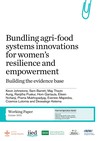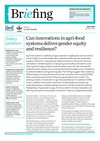Bundling technology for gender equality
This study aims to identify and understand potential socio-technical innovation bundles (STIBs) that advance outcomes such as gender equality, enhance climate resilience and increase income opportunities for women in agricultural value chains.

Applying a gender lens to the implementation of ‘socio-technical innovation bundles’ (STIBs) could advance outcomes like gender equity among rural women in the global South (Photo: USAID Digital Development, via Flickr, CC BY 2.0)
Technologies and innovations have great potential to enhance the resilience of people working in different value chains - to prepare, recover, and adapt from climate impacts and shocks. And to achieve desired outcomes such as better nutrition and increased income.
But access to technologies and innovations alone are rarely enough to enable people in various livelihoods to achieve these outcomes.
To overcome this, they must be bundled with additional support functions such as co-designing innovations, financing, behaviour change, groups, equipment training, or business support – packages that have recently been termed ‘socio-technical innovation bundles’ (STIBs).
Women in rural areas, in particular, face social norms and structural barriers that limit their ability to work and grow their businesses and livelihoods. They have less agency, access and control of assets within households, and less access to the various market functions such as affordable financing.
Overall, rural women and others experiencing intersecting marginalisation are generally more at risk of poverty, climate hazards and violence.
STIBs present an opportunity to push gender equality and social inclusion forward. There are many studies that focus on adoptions of innovation or technologies, but there is a dearth of evidence on whether and how adopting them leads to better outcomes such as resilience or food security in different contexts.
IIED and International Rice Research Institute (IRRI) identified a huge opportunity to enhance outcomes, like women’s incomes and resilience, by deploying gendered STIBs into agricultural value chains.
Objectives
This project aims to identify how to apply gender mainstreaming to STIBs interventions to scale up women’s use of technologies and innovations to give them greater resilience to climate impacts and more income.
Ultimately, IIED aims to pinpoint the optimum mix of STIBs that will promote gender equality in different contexts.
What is IIED doing?
IIED is working with IRRI and CGIAR on this scoping study to guide the selection and implementation of STIBs that will advance gender equity among rural women in the global South, especially for their ‘learning labs’. This includes:
- Conducting a literature review to identify evidence of resilience outcomes for women in different contexts in Asia, Africa, Latin America, and the Middle East and North Africa
- Interviewing global experts in technology adoption, agriculture, training, financing and other relevant sectors
- Developing a framework for STIBs based on the findings gathered, and gender-responsive approaches, and
- Publishing the results to share knowledge on best practices to apply STIBS with a gender lens.




